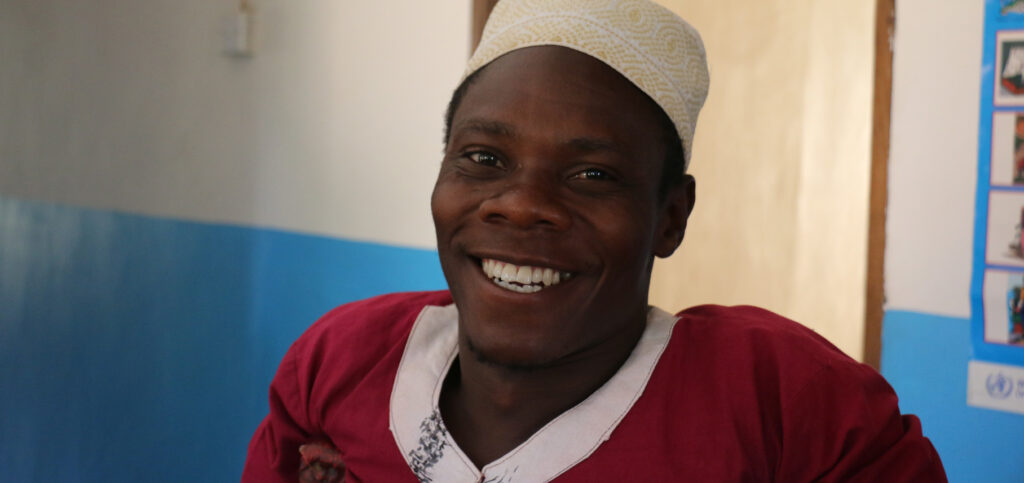Meet Baker

My name is Kabugu Abubakar. I am 38 years old, born on the 12th June 1982.
I joined Molly and Paul in November 2009 when I first worked at Shalom village Medicare, a clinic in Busega Kampala that offered health services to pupils of Molly and Paul School, New Kabale Busega.
In July 2010 I was asked by Rosemary Byass a Volunteer (now Trustee of POACC) and a clinic ambassador from the UK to transfer to Kamuzinda children’s clinic in Masaka. Rosemary wanted to improve the Health services offered at this clinic, including setting up a diagnostic laboratory for proper diagnoses and treatment.
Professionally I am a medical laboratory Technician, holding qualifications from Jinja laboratory training Institute attained in 2007.
My great success and achievement at the clinic are many, but the greatest is when I treated a volunteer from Ireland who was bitten by a black mamba snake one evening. It was such a terrible moment because no one had belief and hope that her case could be handled at our clinic and plans made were to book a flight back home that night to see a Tropical doctor in Ireland. Her case was successfully handled.
Sadly, there have been hard moments too, such as Paul, a child from one of the remote villages who at 2½ years old was so malnourished he appeared half his age. Paul was fostered at the clinic for 4 years but sadly died of leukaemia.
Molly and Paul children’s clinic is such great gift to the schools and the local community. This is the only clinic in a parish of 11 villages graded aa a level-2 health centre.
It renders free services to all students in school, Staff members and all vulnerable members of the local community, including the elderly and disabled.
Being the only clinic with a standard diagnostic laboratory gives quality health services to students and reduces the risks of carrying or transporting sick students to the only Government Health centre about 5km from the schools.
This clinic is also strategically located in Kamuzinda village which gives the local community access to 24-hour medical care.
My hope for the future of the clinic is to see that it is upgraded to a Health centre-3, with extended health service provision in Family planning and Maternal health; conducting deliveries, providing ART clinics for people living with HIV, a Dental clinic and more.
There is also hope to expand general medical care offered, and have larger wards outside the unit to accommodate more inpatients.
The biggest challenge facing this clinic is its full dependence on donations for its survival. The clinic offers free services; the majority of medication is provided at no cost to patients. Therefore, the clinic cannot raise money to pay for its running costs: restocking of drugs, paying staff salaries, utility costs and other expenses without donations from Pearl of Africa Childcare.
I am a Muslim by faith born in Mbale district eastern Uganda, in a family of ten children, I was hit by polio at two years of age. My parents struggled to save my life and as a result I suffered physical disability.
My upbringing was hard for my parents, who were peasant farmers and could not afford to buy me a wheelchair or take me to hospital for physiotherapy care and treatment. I remember always being carried on their backs. They resorted to using herbs to massage my paralysed legs to try and make them stronger.
In Africa and Uganda in particular, giving birth or having a disabled child in a family can be regarded as a curse, where others in a community avoid interaction or marrying into members of that family. Often, families with disabled children used to keep them away from community members, and nobody would consider them useful in society.
At the age of five, a passing social worker from Busumbu Home for the Disabled in Mbale spotted me and agreed with my parents to make arrangements to have me taken to their home for rehabilitation and to start school.
While at the rehabilitation home, I underwent two surgical operations to improve my physical ability and started using Callipers and crutches to support my movement. My parents were very happy and excited to see me standing on crutches and continued caring and supporting me as best they could.
This rehabilitation home provided a bursary scheme to me and provided for my basic needs and school materials. Seven years later I completed my primary level education and scoring a first grade in the final primary leaving examination gave me a lot of courage to continue with my studies. In Mbale town where I lived, many of the beggars on streets were disabled people and my determination to have a good future, with my mother’s encouragement to study pushed me to make sure I had a different choice.
Due to my experience, I was always determined to overcome any challenge. I always believed in myself, knowing disability is not inability. With the help of a bursary I completed O-levels and A -levels. Having perform well at A-level, I was able to join a Medical Lab Training School on a Government sponsorship to fulfil my ambition to become a Medical Lab Technician.
Having been cared and supported by my family; father, mother, brothers and sisters, I never wanted to disappoint them. I always wanted to become a Doctor and support my mother who had diabetes mellitus disease, unfortunately this never happened as she died when I was studying A-levels, before my dream came true.
I am a father of four, living with my lovely wife Sharifah. Outside medical work I enjoy farming and spend much of my free time in my garden. I grow all sorts of vegetables, food crops and fruit both for feeding my family and to sell to earn a living. I also keep chickens and goats.

